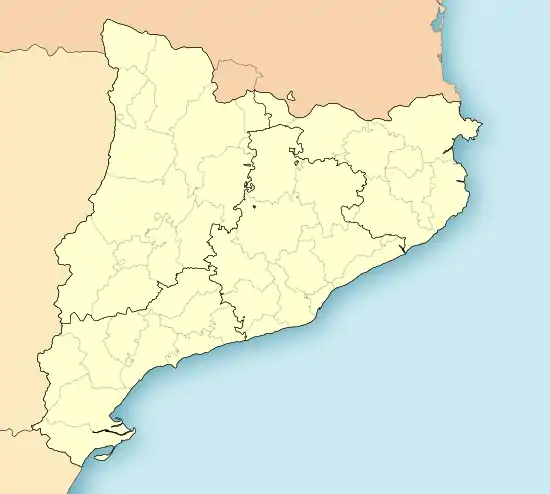Bellpuig | |
|---|---|
 | |
 Flag  Coat of arms | |
 Bellpuig Location in Catalonia | |
| Coordinates: 41°37′36″N 1°0′48″E / 41.62667°N 1.01333°E | |
| Autonomous community | |
| Province | Lleida |
| Comarca | Urgell |
| Government | |
| • Mayor | Jordi Estiarte Berenguer (2019) (ERC) [1] |
| Area | |
| • Total | 35.0 km2 (13.5 sq mi) |
| Elevation | 308 m (1,010 ft) |
| Population (2018)[3] | |
| • Total | 5,060 |
| • Density | 140/km2 (370/sq mi) |
| Postal code | 25250 |
| Website | bellpuig |
Bellpuig (Catalan pronunciation: [ˌbeʎˈputʃ]) is a town in the comarca (county) of l'Urgell in Catalonia, Spain.
Nowadays Bellpuig is the third most important town in the area of Urgell. The town, located between the three little hills appearing in the flag, is served by Bellpuig railway station.
People
Bellpuig in 1487 was the birthplace of Ramón de Cardona, Baron of Bellpuig, Count of Alvito and Duke of Somma (in Catalan Ramon Folc III de Cardona-Anglesola). He was a Catalan general of the Holy League troops and viceroy of Naples from 1509 to 1522. His funeral monument is in Bellpuig, where the body was transported nine years after his death on 10 March 1522. The monument was designed and built by Giovanni da Nola and Genoese master sculptors, it is one of the most important examples of Renaissance art in Spain.[4]
Events
The Festival of the Verge dels Dolors takes place every year and includes a religious procession. This celebration is more than 300 years old.
Sports
The village has one of the most important Motocross facilities in the south of Europe. The Circuit de Motocros Montperler held many national and international competitions in the past.
Twin towns
 Bormio, Italy
Bormio, Italy
References
- ↑ "Ajuntament de Bellpuig". Generalitat of Catalonia. Retrieved 2015-11-13.
- ↑ "El municipi en xifres: Bellpuig". Statistical Institute of Catalonia. Retrieved 2015-11-23.
- ↑ Municipal Register of Spain 2018. National Statistics Institute.
- ↑ King, Georgiana Goddard (July 1921). "The Cardona Tomb at Bellpuig". American Journal of Archaeology. 25 (3): 279–288. doi:10.2307/497804. JSTOR 497804.
External links
- Government data pages (in Catalan)